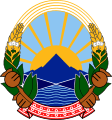Macedonians facts for kids
Macedonians, also called North Macedonians, are an ethnic group who mostly live in the country of North Macedonia. They are native to the Macedonia region and speak the Macedonian language.
Contents
Where Macedonians Come From
The Macedonian language grew from older Slavic languages in the area after the Roman Empire ended. Many parts of Macedonian culture were shaped by the medieval Byzantine, Bulgarian, and Serbian empires. These powerful empires each ruled the region for a period.
Scientists believe the genetic background of Macedonians is similar to other South Slavic people. This includes groups like Bulgarians, Serbs, Bosnians, and Montenegrins. It also has links to people in northern Greece and Romania.
Slavs arrived in the Balkans and Macedonia after the Roman rule ended. People generally agree that many of the people living in the Balkans after these "invasions" were already there. New groups and a few immigrants made people see themselves as different from their neighbors. Later, the Sclaveni people in Macedonia joined the Bulgarian Empire.
The history of ethnic Macedonians has been shaped by changes in population and politics. After the Ottoman Empire ended in the early 1900s, the Socialist Republic of Macedonia was formed. This happened after World War II as part of Socialist Federal Republic of Yugoslavia.
Where Macedonians Live
Most ethnic Macedonians live along the Vardar river valley. This is the central part of North Macedonia. They make up about 64.18% of the country's population. This was about 1,297,981 people in the 2002 census.
Smaller groups of Macedonians live in eastern Albania, northern Greece, and southern Serbia. These areas are mostly near the borders of North Macedonia. Many Macedonians have also moved to other countries. Large numbers live in Australia, the United States, and Canada. Many also live in European countries like Germany, the United Kingdom, Italy, and Austria.
How Macedonians Make a Living
In the past, most Macedonians worked in agriculture, which means farming. After the People's Republic of Macedonia was formed, society began to change. This change was based on socialist ideas. New middle and heavy industries were started.
Macedonian Language
The Macedonian language (македонски јазик) is part of the Eastern group of South Slavic languages. Standard Macedonian became the official language of the Socialist Republic of Macedonia. It was officially set up in the 1940s. Since then, a strong tradition of Macedonian literature has grown.
The language most similar to Macedonian is Bulgarian. After that comes Serbo-Croat. All South Slavic languages, including Macedonian, are part of a dialect continuum. This means they blend into each other. Macedonian is found between Bulgarian and Serbian. The Torlakian dialect group is a mix between Bulgarian, Macedonian, and Serbian.
The way Macedonian is written uses an orthography based on the Cyrillic alphabet. It also has its own special rules for spelling and punctuation.
Important Symbols
- Sun: The official flag of North Macedonia was adopted in 1995. It shows a yellow sun with eight rays spreading out to the edges. The background of the flag is red.
- Coat of Arms: After becoming independent in 1992, North Macedonia kept its coat of arms. This symbol was first adopted in 1946.
- Vergina Sun: This symbol was on the official flag of North Macedonia from 1992 to 1995. The Vergina Sun is used by some Macedonian groups living outside the country. It is thought to be linked to ancient kings like Alexander the Great and Philip II of Macedon. However, it was used as a design long before their time. Some people in present-day Macedonia see it as a symbol that doesn't belong to Slavic cultures. They believe it is a direct claim to the history of Philip II. Greece copyrighted the Vergina Sun as a state symbol in the 1990s. The Vergina Sun on a red background was the first flag of independent North Macedonia. It was removed from the state flag in September 1995 due to an agreement with Greece. The Vergina Sun is still used unofficially by some groups in the country and by Macedonians living abroad.
Related Information




